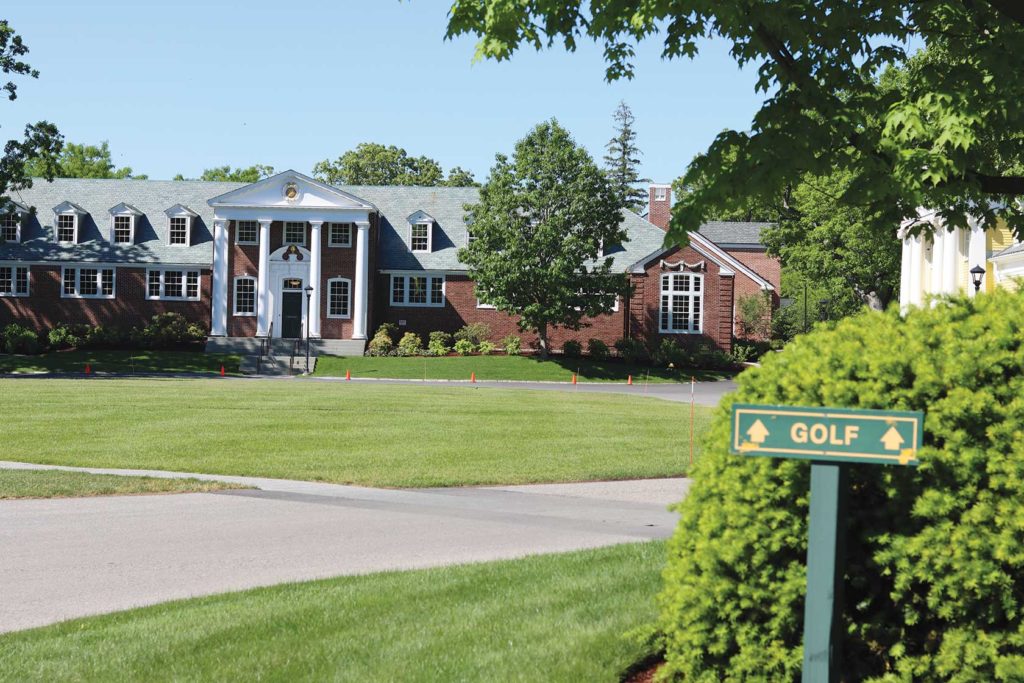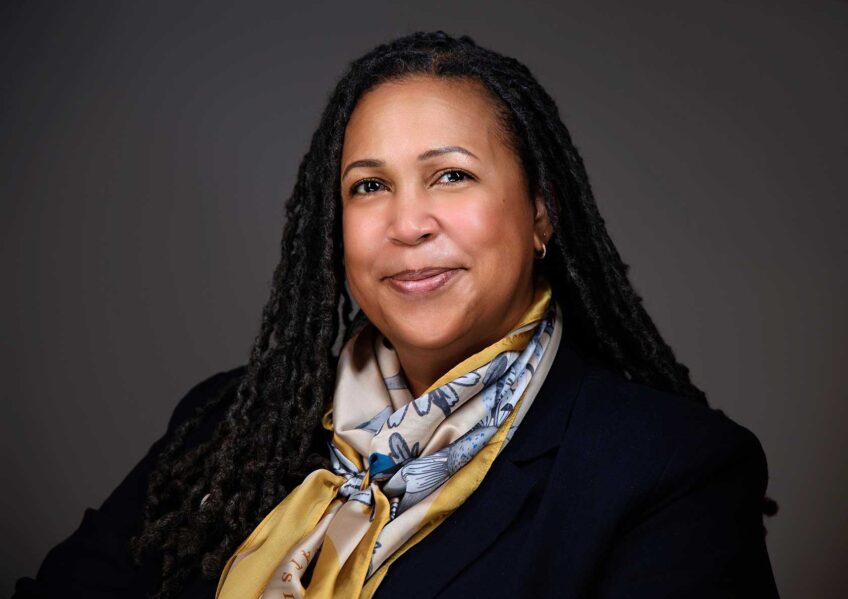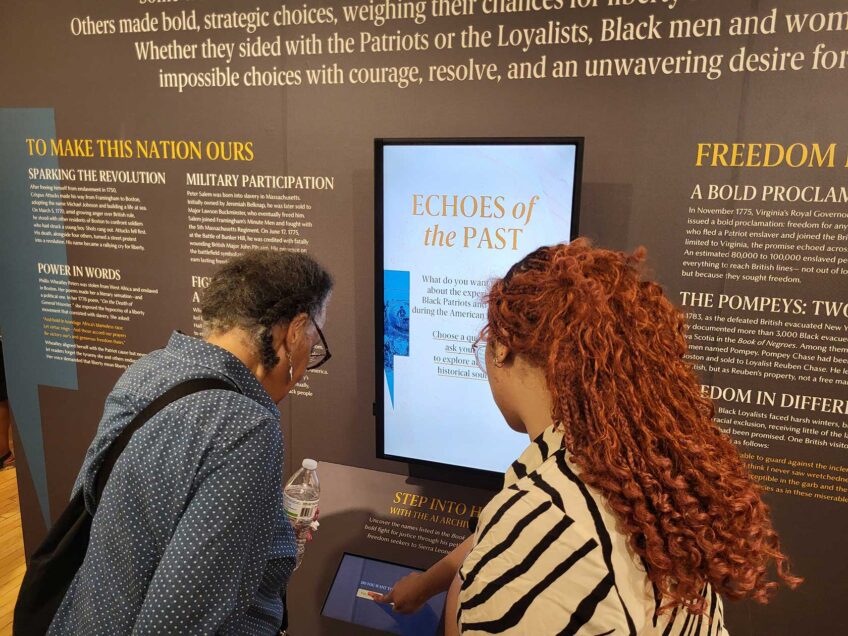Blacks integral to history of golfing
As U.S. Open comes to Brookline, a reexamination of Blacks in golf

In two weeks, The Country Club, Brookline’s prestigious private course whose name needs no elaboration, will take center stage in the world of golf for the 2022 U.S. Open.
In advance of the attention and scrutiny that come with hosting one of the sport’s four major championships, The Country Club rolled out a new internship program to introduce college students from underrepresented backgrounds to the cloistered business of golf: the Lee Elder Internship.

Golf legend Lee Elder and attorney Macey Russell. COURTESY PHOTO
Before his death in late 2021, the late golf legend planned the initiative with his friend and lawyer Macey Russell, a club member who grew up in Brockton and is now a partner with the old-school Boston law firm Choate, Hall & Stewart.
The idea of bringing greater diversity to a sport with a troubled history of racial access, said Russell, “was first started with Lee Elder over the years, more recently at the Masters in 2021 and the U.S. Open in 2019, when we had discussions about his legacy and his continuing quest to make golf more open and inclusive.”
The Lee Elder Internship Program will host 25 young people in Boston for the week of the U.S. Open. Between panels on leadership and business etiquette, these paid interns will ride duck boats, network and engage in experiential learning. Visitors to the U.S. Open merchandise pavilion will often find interns working the check-out line. NBC Sports cameras will film them for a short video.
“We are trying to make a difference,” said Macey, who chairs the club’s diversity, equity and inclusion efforts for the 2022 U.S. Open host committee. “People will judge later how effective we were in terms of doing it, but you have to start somewhere.”
“Obviously, there are strata in every function of life,” said Lyman Bullard, chairman of The Country Club’s board of governors and a colleague of Russell’s at the downtown law firm, where he practices sports law. “But I think the biggest way to tackle that is just to create more opportunity earlier, and that’s one of the things that we hope this internship will do.”
Opportunities for minorities in golf today are linked to the game’s leading emblem of integration, Tiger Woods. When Woods won the Masters in 1997, the first of his 15 major championships to date, he launched a new era of representation in the sport and carried unique historical context. The Masters, played annually at Augusta National Golf Course in Georgia, had no Black participants before 1975. The club at Augusta held out against integration until 1990, when Gannet executive Ron Townsend joined.
U.S. Open host The Country Club reportedly did not admit its first Black member until 1995. The private club, citing longstanding policy prohibiting any public discussion of members, declined to confirm or deny that James Cash, a prominent Black faculty member at Harvard Business School, joined The Country Club that year. Other African Americans have since joined, according to sources.
To honor Elder during tournament week, The Country Club crowd will gather at the Newbury Boston for a fundraiser called “Tee Up Diversity.” For Russell, it will be “an evening of celebration, as well as reflection.”
Comedian Anthony Anderson will emcee the ceremony, featuring the legend of Elder breaking the color barrier at the Masters in 1975. Renee Powell and Jim Dent will be honored as well.
Elder and Dent competed for years on the tour run by the United Golfers Association, the Black alternative to the Professional Golfers Association of America, which thrived during the whites-only era of PGA membership policy.
Re-established in 2020, the UGA now raises money to fund training of and investment in emerging Black golfers.
In 1967, the decade before the final Negro National Open, Renee Powell secured her LPGA tour card as only the second Black woman to turn pro. Since Powell and trailblazer Althea Gibson joined the LPGA in the 1960s, only six other Black women have repeated the feat.
Today, Powell is the golf pro at Clearview Golf Course, the East Canton, Ohio course built by her father, William “Bill” Powell.
Proceeds from Tee Up Diversity will flow to multiple scholarships, one in Elder’s name at the Francis Ouimet Scholarship Fund, and another for students of the business or game of golf at historically Black colleges and universities, as well as funding grants for grassroots golf organizations. The evening will also mark the founding of the Lee Elder Internship program.
In life, Elder was a four-time Negro National Open champion. He learned the game as a caddie and became a world-class professional golfer who set the stage for Tiger Woods’ 1997 Masters victory. That year, Elder was waiting by the 18th green to see Tiger’s record-setting triumph punctuated with an historic fist-pump.
“He was one of the heroes of the segregated golf tour,” said Russell of his friend Elder, who was denied a chance to play the PGA Tour until after he was “post-prime.”
In retirement, Elder backed a youth golf program in Indianapolis designed to improve diversity in golf. At 84 years old in 2019, Elder received the Bob Jones Award, the USGA’s highest honor, for sportsmanship.
Now, less than a year after his passing, Elder will be recognized by golf’s elites for his lifelong role as an ambassador for the sport. His story will be immortalized in programs like the internship and scholarship that bear his name.
Linked to only the fourth U.S. Open in The Country Club’s 140-year history, Elder joins the company of another pioneering golf myth with ties to the very first U.S. Open held at The Country Club, Francis Ouimet. The two men’s stories of perseverance through golf’s divides of race and class echo one another.
Ouimet was the son of a French-Canadian immigrant who saw golf as an expensive waste of time. In the 2002 book and 2005 film “The Greatest Game Ever Played,” Ouimet wins over his father as he wrests the game of golf from the hands of foreign aristocrats, staking claim to the game for every American amateur tracking the box score at home.
Known as the father of amateur golf in America today, Ouimet was a kid from a working-class home along The Country Club’s 17th fairway when he picked up golf. He caddied at The Country Club — learning each hole intimately along the way. He collected lost balls and was loaned his first set of clubs.
“He was a tremendous gentleman, a great sportsman,” said Bullard of Ouimet. “Coming from the humble beginnings that he did, his was a very inspirational story.”
Ouimet practiced on a DIY-course in his backyard and by moonlighting a few holes across the street while club greenskeepers slept. Having mastered each, he ventured into Boston to find a place to play.
“Franklin Park was a public course, and we could go there and play unmolested,” Ouimet wrote in his 1932 book, “A Game of Golf.”
“Franklin Park is a golf course that, no matter what your skill level is, no matter what your economic status is, you can go play there and feel comfortable,” said Keith McDermott, a member of the Franklin Park Interclub, who plays the Roxbury course weekly.
When the 1913 U.S. Open at The Country Club brought the world’s best golfers to town, England’s Harry Vardon and Ted Ray, Ouimet had to play. He borrowed $25 from his mother for eligibility, working the debt off over the summer. Then, against the odds and with 10-year-old truant Eddie Lowery lugging his bag, Ouimet played both Brits to a playoff — golf’s tie-breaker — and won.
The game that Ouimet played back then was hardly recognizable today. In place of the dimpled golf balls and wooden tees, caddies made a small mound of sand at the tee box of every hole, carefully placing on top the golfer’s ball, then made of gutta-percha resin.
Still, well before the 1913 U.S. Open, African Americans were quietly influential in the sport. The stories are well documented in Calvin Sinnette’s “Forbidden Fairways” and Pete McDaniel’s “Uneven Lies.”
In Boston, a Black Harvard-educated dentist named George Grant filed the first patent application for a wooden golf tee in 1899. Sharing his invention with friends, Grant’s tees didn’t circulate much beyond the Arlington Heights meadowland where he played casually. Ouimet, Vardon and Ray would have been oblivious. It would fall to the designer of the “Reddy Tee” 23 years later, Dr. William Lowell Sr., to commercialize the product.
When The Country Club held its first U.S. Open in 1913, the board of directors invited John Matthew Shippen Jr. to the field. Shippen was the son of a Black father — a Presbyterian minister at the Shinnecock Indian Reservation on Long Island — and a mother from the tribe that lived there. He had already played in four U.S. Open tournaments before the year 1902.
“His name was known in golf circles,” Bullard said of Shippen. “The board voted to take him in.”
Shippen effectively came out of retirement to play in his fifth and final U.S. Open in 1913. At the end of his career, he was hired as America’s first golf professional.
For nearly a decade after the UGA began the Negro National Open in 1926, Shippen could often be found competing in the field. In the first Negro National Open, held at the Black-owned Mapledale Country Club in Stow, Massachusetts — today called Stow Acres, Shippen placed fourth.
In 1932, a 10-year-old named Charlie Sifford carried his first golf bag as a caddie at Carolina Country Club in Charlotte, N.C. He seized every opportunity to swing a golf club.
“None of us had our own clubs, of course,” Sifford wrote in “Just Let Me Play,” his 1992 book. “But on Mondays, when the caddies were officially allowed to play the course, the members would let us use their clubs.”
Like Ouimet, Sifford often snuck onto the course to play. He quickly became the best golfer around. But the white club members grew uneasy. Sutton Alexander, the club owner, had a strong bond with Sifford and warned him about the risk of violence.
With Alexander’s help, Sifford moved to Philadelphia. There, he began a career hustling lesser golfers for a living, initially with his accomplice Howard Wheeler. Rarely seen without a stogie in his mouth, Sifford would go on to win so many Negro National Open trophies — six total — that the UGA just told him to keep it.
In 1961, as PGA voted to end its Caucasian-only clause, Charlie Sifford became the first Black golfer to receive a PGA Tour card. Occasionally called “the Jackie Robinson of golf,” Sifford rejected the analogy because the doors of golf had not been opened to Blacks as they had in baseball. Certainly, he suffered enough abuse from fans to warrant the moniker.
Sifford wrote, “I’m ashamed and embarrassed for the game of golf itself, because its record on both the professional and amateur levels in regards to minorities has been unspeakable.”
In his book, Sifford recalls a spectator kicking his ball away from the green in the final round of the 1962 Dallas Open. In 1963, he did not qualify for the U.S. Open played that year at The Country Club. Far more formalized a tournament than in 1913, no special invitation was forthcoming.
“The pioneers who opened up the game for all of us had many of the same experiences,” Tiger Woods wrote at the start of “Uneven Lies.” “From John Shippen to Joe Louis, Bill Spiller, Ted Rhodes and Charlie Sifford and to Lee Elder, they all encountered the steamy glare of intolerance.”
Bullard acknowledged, “Both the Club and the USGA have recognized that golf historically has not been a particularly diverse sport.”
“We recognize where we were,” said Kamille Ramos, the USGA’s liaison to the Lee Elder internship program, “but also where we want to be.”
Sifford persevered, and on August 20, 1967, he won the Greater Hartford Open — the first Black man to win a full PGA Tour event. In 1969, he won again in Los Angeles. In 2014, President Barack Obama awarded Charlie Sifford the Presidential Medal of Freedom.
When Sifford passed away in 2015, Woods referred to him as grandfather.
Writing the foreword to “Just Let Me Play” in 1992, Arthur Ashe stated, “Nearly all Black professional golfers began the game as caddies. Very few had paid lessons from competent instructors. The public courses they invariably were forced to play on could best be described as hard scrabble.”
Today, caddie programs at clubs across the country are being supplanted by golf carts. Yet, at The Country Club, a major backer of the Francis Ouimet Scholarship Fund, the tradition lives on.
“As a general rule, our members don’t take carts unless they have a medical reason to do so,” said Bullard, who described The Country Club fairways as a “walking course.”
“We remain very strong supporters of caddie programs,” he said.
Later this month, the fanfare around the U.S. Open in Brookline will fade and the Lee Elder interns will pack their bags for home. The future of the internship program — funded by the USGA, private donations, and host venues such as 2023 host The Los Angeles Country Club — remains uncertain. It will fall to others to decide whether the diversity initiative named for the Black golf pioneer will live on.
“It would be tragic if it was a one-off,” said McDermott, Roxbury Community College’s former athletic director. Suggesting the USGA include the Lee Elder Internship Program in criteria for future hosts, he continued, “It should be systemic.”
Hesitant to speak for the USGA and future U.S. Open hosts, Bullard said, “Macey, myself and The Club are very happy to have them take this and really move it forward as kind of a USGA tradition at the U.S. Open.”
In a statement from the USGA, its communications manager did not commit to continuing the program but left the door open.
The USGA’s brand communications manager, Kimberly Barrett, said in a statement that the organization “will evaluate the success of the weeklong program upon its completion.”






